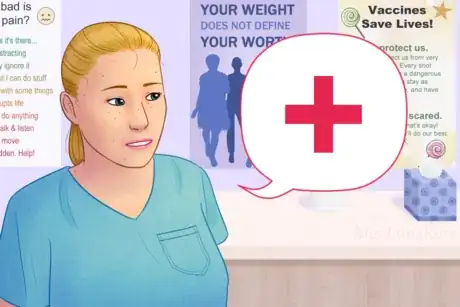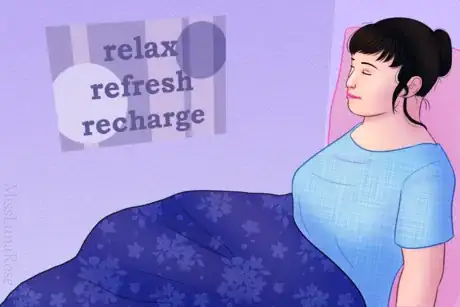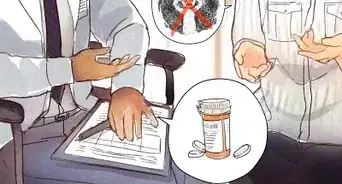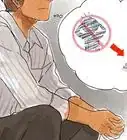This article was co-authored by Ashley Smith, PhD. Dr. Ashley Smith is a Licensed Clinical Psychologist and the Co-Founder of Peak Mind: The Center for Psychological Strength. With over a decade of experience, she specializes in treating anxiety and obsessive-compulsive spectrum disorders using Cognitive Behavioral Therapy (CBT). Dr. Smith has been featured in several media publications such as The Washington Post and Thrive Global. She has also been published in multiple peer-reviewed journals, including the Journal of Anxiety Disorders and The Behavior Therapist. Dr. Smith holds a BA in Psychology from The University of Central Arkansas and both an MA and PhD in Clinical Psychology from The University of Nebraska, Lincoln.
There are 10 references cited in this article, which can be found at the bottom of the page.
This article has been viewed 21,024 times.
Psychosomatic illness is when somebody is under so much stress, it begins to make them physically sick. It can be related to a mental health condition such as anxiety or depression. If you are getting inexplicable pains or illnesses, stress may be the cause.
Steps
-
1Get a psychological evaluation. A specialist can help evaluate your stress level, and if you're showing signs of a disorder. They may ask you to talk about your life experiences, and fill out some questionnaires. They can screen you for various illnesses that may be related to your symptoms. However, if you don't have a psychologist in your area, you can always go to your primary care physician. Sometimes people develop psychosomatic issues due to...[1]
- Depression
- Complex PTSD
- Anxiety disorders
- Illness Anxiety Disorder
- Stressful life events, not related to a diagnosable disorder
-
2Recognize the signs of a psychosomatic illness. Psychosomatic illnesses can cause inexplicable symptoms that seem to come from nowhere. This can include...[2]
- Fatigue
- Nausea/vomiting
- Fever
- Constipation
- High blood pressure
Advertisement -
3See a therapist for help with stress management. Therapies such as CBT and DBT can offer techniques to address anxieties and calm yourself down.[3] The therapist can also help you pinpoint major sources of stress in your life, and talk with you about how to manage those problems.
- Cognitive Behavioral Therapy (CBT) helps you identify thinking errors (e.g. "I'm a failure" or "Everyone hates me") that may be contributing to your stress.
- Dialectical Behavior Therapy (DBT) helps you build interpersonal and self-calming skills.[4] It can be helpful for people with mood disorders and a variety of disorders that involve serious stress.
-
4Consider seeing a hypnotherapist. Hypnotherapy is basically what it sounds like: a combination of hypnosis and therapy. It can help you manage your illness. Hypnotherapy tricks your mind into not letting yourself get worked up, which can help lower your blood pressure if it's high, preventing future health problems.[5]
-
5Look into serious lifestyle changes. Psychosomatic illness can be a sign that you're doing something in your life that is too stressful. Is there something that you wish you could escape from? Consider your illness a sign that you seriously need to get away from that thing. Sometimes, the key to resolving a psychosomatic illness might be...[6]
- Getting a lower-stress job
- Changing your career path
- Taking easier classes in school
- Accepting yourself as you are
- Cutting a toxic person out from your life
- Treating an untreated illness that was stressing you out
- Moving from an unwelcoming community towards a more open-minded one
-
6Find small ways to reduce stress in your life. Lowering stress can reduce or remove psychosomatic symptoms. See if you can limit work stress, and spend less time around people who make you feel bad. Work on making changes to take better care of yourself.[7]
-
7Identify a few good listeners you can talk to. Who can you usually count on to validate your feelings and help you through tough times? Reach out to these people when you're having a rough time. If one of them can't talk, try someone else.
- If you're worried about them not wanting to handle your emotions, just ask first: "I've been having a hard time lately. Is now an OK time to talk about it?" Then, if they are too stressed or too busy to help out, they can just tell you so.
- Also, have a few backup plans in case everyone is unavailable. Can you make art, watch a relaxing show, work on a fun project, et cetera?
-
8Spend plenty of time relaxing. Take a warm bath, snuggle with loved ones, read a good book, or hang out with a good friend. Relaxation is an important part of a balanced life. Make sure to get in at least 2 hours of fun time each day for your health.
-
9Look after your body. Sleep for at least 8 hours every night, fill 1/3 of your plate with fruits and vegetables, and get exercise. Try taking walks with loved ones, hiking, swimming, or playing backyard sports with a family member. Your physical health is important.[10]
-
10Try aromatherapy. Incense and essential oils have been known to help with some of the symptoms. Talk to an aromatherapist and tell them about the symptoms you've been experiencing so they can pick something out specifically for that problem.
- Lavender oil may be helpful.
- Chamomile tea can help calm your nerves.
Expert Q&A
-
QuestionHow do you calm psychosomatic symptoms?
 Ashley Smith, PhDDr. Ashley Smith is a Licensed Clinical Psychologist and the Co-Founder of Peak Mind: The Center for Psychological Strength. With over a decade of experience, she specializes in treating anxiety and obsessive-compulsive spectrum disorders using Cognitive Behavioral Therapy (CBT). Dr. Smith has been featured in several media publications such as The Washington Post and Thrive Global. She has also been published in multiple peer-reviewed journals, including the Journal of Anxiety Disorders and The Behavior Therapist. Dr. Smith holds a BA in Psychology from The University of Central Arkansas and both an MA and PhD in Clinical Psychology from The University of Nebraska, Lincoln.
Ashley Smith, PhDDr. Ashley Smith is a Licensed Clinical Psychologist and the Co-Founder of Peak Mind: The Center for Psychological Strength. With over a decade of experience, she specializes in treating anxiety and obsessive-compulsive spectrum disorders using Cognitive Behavioral Therapy (CBT). Dr. Smith has been featured in several media publications such as The Washington Post and Thrive Global. She has also been published in multiple peer-reviewed journals, including the Journal of Anxiety Disorders and The Behavior Therapist. Dr. Smith holds a BA in Psychology from The University of Central Arkansas and both an MA and PhD in Clinical Psychology from The University of Nebraska, Lincoln.
Licensed Clinical Psychologist Try grounding yourself and focusing on the present. You could take some deep breaths and feel your body breathe, or push your feet into the ground and feel the sensations.
Try grounding yourself and focusing on the present. You could take some deep breaths and feel your body breathe, or push your feet into the ground and feel the sensations. -
QuestionWhy am I getting stressed so easily?
 Ashley Smith, PhDDr. Ashley Smith is a Licensed Clinical Psychologist and the Co-Founder of Peak Mind: The Center for Psychological Strength. With over a decade of experience, she specializes in treating anxiety and obsessive-compulsive spectrum disorders using Cognitive Behavioral Therapy (CBT). Dr. Smith has been featured in several media publications such as The Washington Post and Thrive Global. She has also been published in multiple peer-reviewed journals, including the Journal of Anxiety Disorders and The Behavior Therapist. Dr. Smith holds a BA in Psychology from The University of Central Arkansas and both an MA and PhD in Clinical Psychology from The University of Nebraska, Lincoln.
Ashley Smith, PhDDr. Ashley Smith is a Licensed Clinical Psychologist and the Co-Founder of Peak Mind: The Center for Psychological Strength. With over a decade of experience, she specializes in treating anxiety and obsessive-compulsive spectrum disorders using Cognitive Behavioral Therapy (CBT). Dr. Smith has been featured in several media publications such as The Washington Post and Thrive Global. She has also been published in multiple peer-reviewed journals, including the Journal of Anxiety Disorders and The Behavior Therapist. Dr. Smith holds a BA in Psychology from The University of Central Arkansas and both an MA and PhD in Clinical Psychology from The University of Nebraska, Lincoln.
Licensed Clinical Psychologist Unfortunately, the modern lifestyle tends to promote chronic stress. In this case, it really helps to focus on what's in your realm of control.
Unfortunately, the modern lifestyle tends to promote chronic stress. In this case, it really helps to focus on what's in your realm of control.
Warnings
- In more extreme cases, psychosomatic disorders can cause serious symptoms, like pseudo-seizures and muscle paralysis.[11] It's best to get treatment early on, and take it seriously.⧼thumbs_response⧽
References
- ↑ https://my.clevelandclinic.org/health/diseases/21521-psychosomatic-disorder
- ↑ https://www.talkspace.com/blog/psychosomatic-disorders-definition-symptoms/
- ↑ http://centerforanxietydisorders.com/treatment-programs/psychosomatic-disorders/
- ↑ https://behavioraltech.org/resources/faqs/dialectical-behavior-therapy-dbt/
- ↑ https://www.ncbi.nlm.nih.gov/books/NBK73898/
- ↑ https://www.aafp.org/afp/2007/1101/p1333.html
- ↑ https://my.clevelandclinic.org/health/articles/8133-stress-10-ways-to-ease-stress
- ↑ Ashley Smith, PhD. Licensed Clinical Psychologist. Expert Interview. 22 October 2021.
- ↑ Ashley Smith, PhD. Licensed Clinical Psychologist. Expert Interview. 22 October 2021.







































































Medical Disclaimer
The content of this article is not intended to be a substitute for professional medical advice, examination, diagnosis, or treatment. You should always contact your doctor or other qualified healthcare professional before starting, changing, or stopping any kind of health treatment.
Read More...